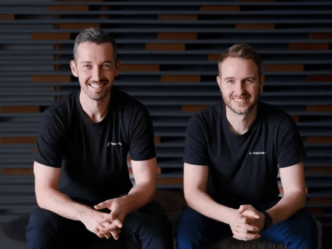Ithaca Investments, based in Milan, operates with an unusual level of discretion, maintaining minimal digital presence and a low-key profile in fundraising circles. Despite this, the firm has a strong influence in Italy’s startup ecosystem, backing high-profile Italian-founded startups such as Scalapay, Soldo, Yapily, Qomodo, and Jet HR.
Founded in 2014 by Luigi Berlusconi, the youngest son of the late Italian prime minister Silvio Berlusconi, and ex-JP Morgan financier Giorgio Valaguzza, Ithaca is a major player in early-stage investments. While Silvio Berlusconi was known for his controversial political and business career, Luigi and Valaguzza aim to bring a more subtle touch to Italy’s startup scene.
Luigi’s vision for Ithaca stems from his understanding of the entrepreneurial drive. “Real entrepreneurs are born with something burning inside them — they feel they have to do something,” says Valaguzza. With tech talent in Italy growing stronger, Ithaca is accelerating its investments. The firm has made eight investments in the last seven months and shows no signs of slowing down.
Ithaca Investments Has A $7 Billion Legacy
Ithaca and its sister family office, H14, are both funded by Silvio Berlusconi’s $7 billion estate. H14 has been active since 2011, investing across hedge funds, private equity, and venture funds, while Ithaca focuses solely on early-stage startups.
Valaguzza, an investor with 14 years of experience, notes that Luigi Berlusconi was one of the first to recognize the growing importance of tech in Europe. In 2014, Ithaca’s founders launched the firm to specifically target seed and pre-seed stage investments, focusing on Italian startups and those with Italian founders based abroad.
Although Ithaca’s investments are sector-agnostic, fintech is a significant focus due to the Berlusconi family’s ownership of retail bank Banca Mediolanum. Portfolio companies include London-based Soldo, Yapily, Berlin-based Sennder, and Italy’s first unicorn, Scalapay, where Ithaca holds a 1.5% stake.
Ithaca Investments Evergreen Strategy
Ithaca’s investment strategy is relatively low-profile. The firm makes small investments, rarely takes lead positions, and is open to follow-on investments as startups mature. “We see ourselves as good fathers to these companies — it’s an evergreen relationship,” says Valaguzza.
Ithaca’s philosophy includes occasionally making follow-on investments through H14 at later stages, such as in the case of Italian travel-tech company WeRoad. Though the firms share similar goals, Valaguzza emphasizes that Ithaca and H14 operate independently.
Controversial Connections
Valaguzza has earned a strong reputation in Italy’s startup ecosystem. Entrepreneurs respect his insight into the local market and his ability to separate his work from his family’s controversial legacy. Despite the notorious past of Silvio Berlusconi, many founders continue to accept investments from Ithaca. “Money is just money at the end of the day,” says a unicorn founder backed by H14.
However, not all of Ithaca’s investments have been without controversy. Facile.it, an online price comparison platform, was a major success for the firm. Acquired by EQT in 2018, Facile.it was later valued at $1 billion in a buyout by Silver Lake Capital. However, its founder, Alberto Genovese, was arrested in 2020 on charges of sexual assault, leading to negative press for Ithaca.
Leveraging Networks and Co-Investments
Ithaca’s reputation has also been built on its strong network. The firm co-invests with some of the leading European VCs, including Highland, DN Capital, Cherry Ventures, HV Capital, and Dawn Capital. This network provides Ithaca with access to European deal flow, while also enabling it to leverage relationships with entrepreneurs and angels across Europe.
Valaguzza notes that while family offices like Ithaca make up a small minority of Italy’s risk-averse private wealth, their influence is growing. “It’s about money first, deal flow comes after,” he says. “Now there’s capital around, it’s giving Italian entrepreneurs that final push.”













